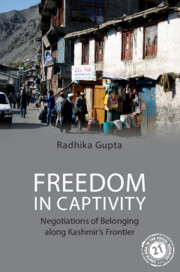Book contents
- Frontmatter
- Contents
- List of Figures
- Acknowledgements
- List of Abbreviations
- Notes on Transliteration
- Introduction: Freedom in Captivity
- 1 Genealogies of Political Consciousness
- 2 Reforming Self and Society
- 3 Fighting for Justice
- 4 Talking about Culture
- 5 Living on the Edge
- Epilogue
- Glossary
- Bibliography
- Index
4 - Talking about Culture
Published online by Cambridge University Press: 10 January 2023
- Frontmatter
- Contents
- List of Figures
- Acknowledgements
- List of Abbreviations
- Notes on Transliteration
- Introduction: Freedom in Captivity
- 1 Genealogies of Political Consciousness
- 2 Reforming Self and Society
- 3 Fighting for Justice
- 4 Talking about Culture
- 5 Living on the Edge
- Epilogue
- Glossary
- Bibliography
- Index
Summary
Often befuddled by the typically open-ended nature of anthropological inquiry, people in Kargil would ask me, ‘But what is your topic?’ Sometimes, the easiest answer to proffer was ‘the culture and history of the region’. My response elicited a variety of reactions and suggestions. The most common was, ‘If you want to study culture go to Chigtan or Dartsigss–Garkone. People there have preserved their culture.’ The cultural qualifications of Chigtan lay in people continuing to wear traditional clothes, such as the goncha (Ladakhi tunic), maintaining their houses as in the ‘olden’ times or being one of the sub-regions of Kargil district where a few elders could still recite the entire Kesar Saga. Similarly, the famed mythic ‘pure Aryan’ villages of Dartsigss and Garkone in the Batalik region were offered as the seats of ‘original culture’. Elaborate floral head adornments, blue eyes and fair skin mark the inhabitants of these villages in the imagination of locals and outsiders alike as exotica. When talking about ‘culture’, comparisons with Leh would also invariably surface, confirming the well-established anthropological insight that culture is always a category of difference and hierarchy. A teenage boy remarked, ‘Leh is more developed because people there have kept their culture. They whitewash their houses and decorate them with prayer flags. That is why outsiders come to see their place and tourists do not come to Kargil.’ His friend added, ‘The culture in our region has died because religion has got mixed up with it.’ When I asked for an example, he lamented how Losar (Tibetan New Year, celebrated in Ladakh in the month of December) was no longer held in his village, Chanegond. ‘Till recently, say about 2000, it was celebrated with so much enthusiasm that every household slaughtered an animal,’ he explained, but also said that animals had become more expensive, and people did not have the time anymore. Conversely, a cleric, somewhat sceptical of my interest in studying the ‘culture’ of Kargil, commented, ‘There is no makhsus [distinct] Kargili culture. What might constitute a culture for Kargil is defined by religion.’
Culture had become a frequent topic of discussion and debate in Kargil’s public sphere, particularly in urban areas such as Kargil town, as consciousness of regional and sectarian identity strengthened since the 1980s.
- Type
- Chapter
- Information
- Freedom in CaptivityNegotiations of Belonging along Kashmir's Frontier, pp. 129 - 159Publisher: Cambridge University PressPrint publication year: 2023



